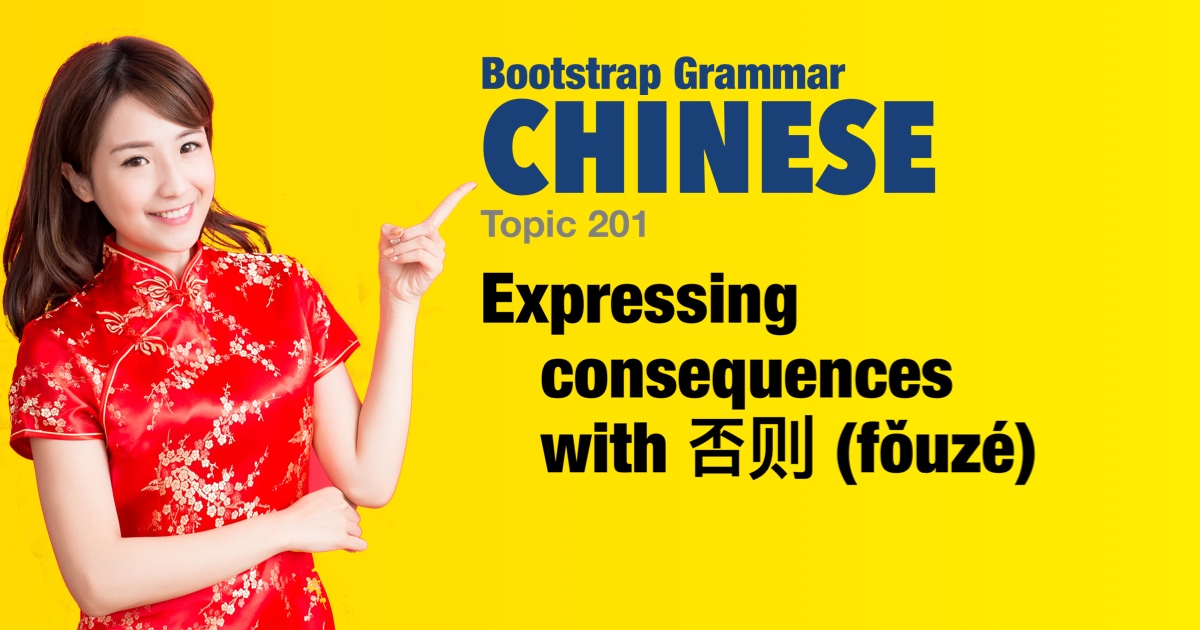Chinese grammar - Expressing consequences with 否则 (fǒuzé) |
|||
|
|||
The Chinese term 否则 (fǒuzé) means 'otherwise' or 'if not,' and is used to express consequences. It indicates potential consequences if a condition is not met. |
| Examples: | |
|
你要努力学习,否则你不会通过考试。
nǐ yào nǔlì xuéxí,#fǒuzé nǐ bú huì tōngguò kǎoshì. You need to study hard, otherwise you won't pass the exam. |
|
|
我们得早点出发,否则会迟到。
wǒmen děi zǎodiǎn chūfā,#fǒuzé huì chídào. We have to leave early, otherwise we'll be late. |
|
|
请保存好你的收据,否则你不能退货。
qǐng bǎocún hǎo nǐ de shōujù,#fǒuzé nǐ bù néng tuìhuò. Please keep your receipt well, otherwise you can't return the goods.
|
|
|
你要穿外套,否则你会感冒。
nǐ yào chuān wàitào,#fǒuzé nǐ huì gǎnmào. You need to wear a coat, otherwise you'll catch a cold. |
|
|
我得快点走,否则会错过火车。
wǒ děi kuàidiǎn zǒu,#fǒuzé huì cuòguò huǒchē. I have to leave quickly, otherwise I'll miss the train.
|
|
|
我们需要多沟通,否则会有误解。
wǒmen xūyào duō gōutōng,#fǒuzé huì yǒu wùjiě. We need to communicate more, otherwise there will be misunderstandings.
|
|
|
你应该休息,否则你会累坏。
nǐ yīnggāi xiūxi,#fǒuzé nǐ huì lèi huài. You should rest, otherwise you'll get exhausted. |
|
|
他要改正错误,否则他会被解雇。
tā yào gǎizhèng cuòwù,#fǒuzé tā huì bèi jiěgù. He needs to correct his mistakes, otherwise he'll be fired.
|
|
|
请按时吃药,否则你的病不会好。
qǐng ànshí chīyào,#fǒuzé nǐ de bìng bú huì hǎo. Please take your medicine on time, otherwise you won't get better.
|
|
|
你要小心,否则你会受伤。
nǐ yào xiǎoxīn,#fǒuzé nǐ huì shòushāng. You need to be careful, otherwise you'll get hurt. |
|
|
我们得按计划行事,否则会有问题。
wǒmen děi àn jìhuà xíngshì,#fǒuzé huì yǒu wèntí. We need to act according to the plan, otherwise there will be problems.
|
|
|
你要按时完成任务,否则会受到处罚。
nǐ yào ànshí wánchéng rènwù,#fǒuzé huì shòudào chǔfá. You need to complete the task on time, otherwise you'll be punished.
|
|
|
请遵守交通规则,否则会被罚款。
qǐng zūnshǒu jiāotōng guīzé,#fǒuzé huì bèi fákuǎn. Please follow the traffic rules, otherwise you'll be fined.
|
|
|
你要吃健康的食物,否则你会生病。
nǐ yào chī jiànkāng de shíwù,#fǒuzé nǐ huì shēngbìng. You need to eat healthy food, otherwise you'll get sick. |
|
|
他需要更多练习,否则不会进步。
tā xūyào gèng duō liànxí,#fǒuzé bú huì jìnbù. He needs more practice, otherwise he won't improve.
|
|
|
我们要保持安静,否则会打扰别人。
wǒmen yào bǎochí ānjìng,#fǒuzé huì dárǎo biérén. We need to keep quiet, otherwise we'll disturb others. |
|
|
你应该听医生的建议,否则会有不良后果。
nǐ yīnggāi tīng yīshēng de jiànyì,#fǒuzé huì yǒu bùliáng hòuguǒ. You should follow the doctor's advice, otherwise there will be adverse consequences.
|
|
|
我们需要节约用水,否则会有水荒。
wǒmen xūyào jiéyuē yòng shuǐ,#fǒuzé huì yǒu shuǐhuāng. We need to economize the use of water, otherwise there will be a water shortage.
|
|
|
他要定期检查汽车,否则会有危险。
tā yào dìngqī jiǎnchá qìchē,#fǒuzé huì yǒu wēixiǎn. He needs to check the car regularly, otherwise there will be danger.
|
|
|
你应该按时睡觉,否则会影响健康。
nǐ yīnggāi ànshí shuìjiào,#fǒuzé huì yǐngxiǎng jiànkāng. You should go to bed on time, otherwise it will affect your health.
|
|
 |
|


 to save'
to save'
